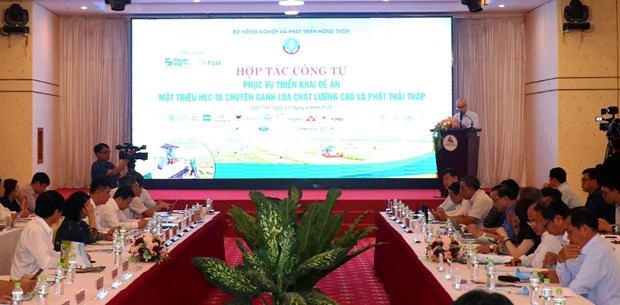
The significance of the public-private partnership (PPP) to the project on developing 1 million hectare of high-quality and low carbon footprint rice in the Mekong Delta region by 2030 was highlighted at a workshop held in the Mekong Delta city of Can Tho on April 4.
The project will be implemented in the provinces of An Giang, Kien Giang, Dong Thap, Long An, Soc Trang, Bac Lieu, Tra Vinh, Hau Giang, Ca Mau, Tien Giang, and Vinh Long, and Can Tho city.
It is part of an effort to restructure the region's production system and value chain with a focus on sustainable farming practices, higher product value, greater business and production efficiency, as well as improved livelihoods of rice farmers, in accordance with Vietnam’s commitment to environmental protection, climate change response, and greenhouse gas emission reduction.
Under the project, greenhouse gas emissions from rice farming is expected to reduce by more than 10% and low-emission, high-quality rice will account for over 20% of the total for export in the entire specialised rice farming region.
According to Deputy Director of the International Cooperation Department under the Ministry of Agriculture and Rural Development To Viet Chau, concerted efforts should be made to realise the set target, with attraction of the public-private investments being a key solution.
Last year, the agriculture minister issued a decision on the establishment of a PPP working group on the rice sector, contributing to concretising Vietnam’s environmental commitments, improving rice added value via value chain, luring more investments, and modernising the agricultural and food systems.
Deputy Director of the Institute of Policy and Strategy for Agriculture and Rural Development Hoang Vu Quang suggested several PPP activities for the implementation of the project, including signing cooperation agreements between businesses and competent State-owned agencies, and those between businesses and cooperatives, which clarify responsibilities of the State, firms, and cooperatives.
He recommended the State build rice cultivation procedures and guidance and transfer technologies to cooperatives, drawing linkage contracts, and handle differences between businesses and cooperatives.
In the meantime, companies are responsible for providing seedlings and techniques, investing in materials in advance, and supervising and supporting the development of cooperatives, he said, adding cooperatives should guide their members how to comply with technical procedures and supervise farmers in measurement of emissions reduction.
At the workshop, experts, agriculture leaders, and representatives from localities, businesses, and cooperatives also discussed the benefits of the State, firms, and cooperatives when joining the PPP model.
Chairman of the Vietnam Rice Industry Association Bui Ba Bong stressed once Vietnamese rice is branded with “low carbon”, it will help improve the image of the Vietnamese agriculture, describing this as the most substantial benefit.
As part of the project, the agriculture ministry has developed five pilot low-carbon cultivation models applied the Measurement, Reporting and Verification (MRV) method in Tra Vinh, Soc Trang, Kien Giang, and Dong Thap provinces and Can Tho city in the 2024-2025 period.
Rice production is one of the largest sources of greenhouse gas emissions in agriculture, and how to reduce the emissions while still ensuring food security and raising farmers’ income in the Mekong Delta is now a hard nut to crack to many.
Bình luận
Bình luận của bạn sẽ được xét duyệt trước khi đăng